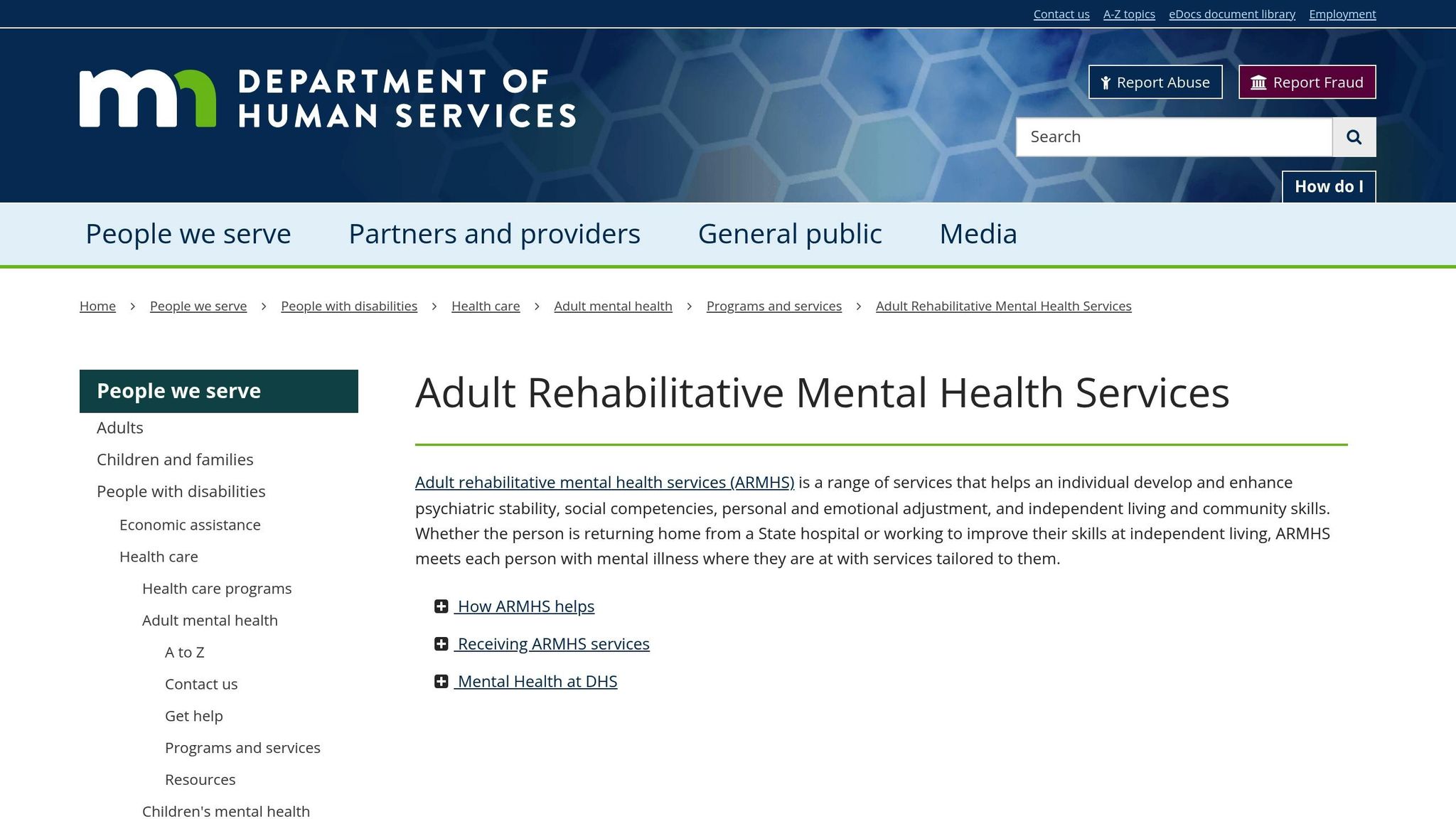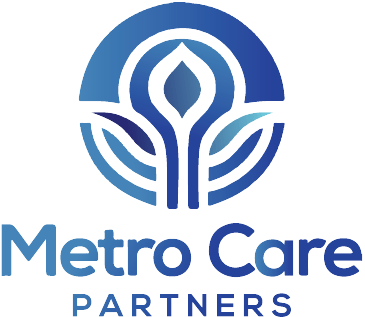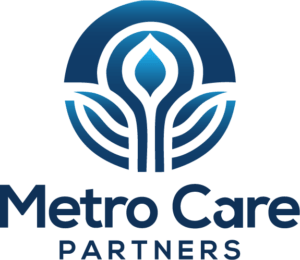Starting your mental health recovery journey can feel overwhelming, but small, practical steps can make a big difference. This guide focuses on the basics of recovery, offering simple strategies to improve your well-being and build a plan that works for you.
Key Takeaways:
- Recovery Areas: Focus on health, home, purpose, and community.
- Set Goals: Start small, be specific, and track progress.
- Build Habits: Create daily routines like regular sleep, exercise, and social connection.
- Self-Care: Prioritize physical, mental, and social well-being.
- Seek Support: Use resources like ARMHS (Adult Rehabilitative Mental Health Services) for skill-building and guidance.
Recovery takes time, but with clear goals, daily habits, and a strong support network, you can make meaningful progress. Let’s get started.
10 Essential Components Of Mental Health Recovery
Mental Health Recovery Basics
Mental health recovery is an ongoing process focused on improving well-being and fostering self-direction. Grasping these core ideas can help you build a strong foundation for your journey.
Key Recovery Concepts
Recovery is supported by four main areas that work together to help you move forward:
| Dimension | Focus Areas | Examples of Progress |
|---|---|---|
| Health | Managing symptoms and making informed decisions | Following a treatment plan, adopting a healthier lifestyle |
| Home | Creating a stable and safe living space | Establishing routines, organizing your environment |
| Purpose | Participating in meaningful activities | Setting goals, pursuing education or employment |
| Community | Building relationships and support networks | Joining support groups, strengthening family connections |
These areas form the basis of any recovery plan. According to Mental Health Minnesota, support systems play a crucial role, with over 98,000 people seeking help through calls, texts, and online chats.
"It’s time to promote appropriate and accessible services for all those in need." – Cher
Use these dimensions to set clear and achievable recovery goals. A good recovery plan might include:
- Personal wellness objectives
- Steps to achieve those objectives
- Daily and long-term activities
- Methods to track changes in mental health
- Plans to manage triggers effectively
ARMHS Program Overview

The ARMHS (Adult Rehabilitative Mental Health Services) program builds on these core principles, offering structured support to help you put your recovery plan into action. This program is designed to help individuals develop strategies to manage mental health challenges and lead fulfilling lives [5,7].
ARMHS services include:
- One-on-one skill-building sessions
- Training in social skills
- Education about medication
- Support for integrating into the community
You can access these services through home visits, clinic appointments, phone or video sessions, or group activities.
ARMHS workers act as mentors and coaches, teaching practical skills through hands-on methods like role-playing and guided practice. They assist clients in:
- Building daily living skills
- Developing coping mechanisms
- Accessing community resources
- Strengthening personal support networks
- Working toward individual recovery goals
The program is tailored to fit your unique needs, helping you take meaningful steps toward better mental health and greater independence [5,7]. By focusing on skill-building and personalized support, ARMHS empowers individuals to improve their daily lives.
Starting Your Recovery Plan
Develop a recovery plan with clear goals, consistent habits, and self-care activities that work for you.
Building on the ARMHS support model, these strategies provide practical steps to move forward.
Goal Planning Steps
Set recovery goals effectively by following these steps:
- Start Small: Focus on one specific area of recovery at a time.
- Be Specific: Define your goal clearly, like walking for 20 minutes three times a week.
- Set Timeframes: Include both short-term and long-term milestones.
- Track Progress: Use tools like a journal or calendar to monitor your achievements.
"Achieving smaller, more immediate, measurable, and realistic goals can help generate momentum in the recovery process." – Mental Health America
Pair these defined goals with a steady daily routine to maintain progress.
Creating Daily Habits
Research shows it takes about 66 days to form a habit. Establishing steady routines can help reduce stress and improve your overall well-being.
Here’s an example of a daily routine:
| Time of Day | Core Habits | Benefits |
|---|---|---|
| Morning | Stick to a regular sleep schedule, eat a healthy breakfast, take prescribed medication | Provides structure to start the day |
| Afternoon | Exercise and connect with others | Enhances energy and mood |
| Evening | Wind down with calming activities and reflect on the day | Encourages restful sleep |
To successfully build habits:
- Add new activities to your existing routine.
- Start small and manageable.
- Plan ahead for busy days.
- Prepare strategies to handle potential obstacles.
Self-Care Activities
Support your recovery by including self-care practices that strengthen your resilience.
Physical Self-Care
- Take regular walks.
- Stick to a consistent sleep routine.
- Eat balanced meals and stay hydrated.
Mental and Emotional Self-Care
- Practice mindfulness or relaxation exercises daily.
- Write in a journal to process thoughts and emotions.
- Try gratitude exercises to shift focus to the positive.
Social and Community Self-Care
- Stay in regular contact with your support network.
- Join group activities that interest you.
- Attend ARMHS sessions for skill-building opportunities.
Choose self-care activities that feel meaningful to you and ease them into your daily life. Allow yourself time to adjust and make these habits part of your routine.
sbb-itb-986d218
Getting Help and Support
Building a recovery network is crucial. Use local resources and form meaningful connections to support your journey.
Local Support Services
ARMHS (Adult Rehabilitative Mental Health Services) offers assistance through trained professionals who help develop practical skills.
| Service Type | Description | Setting |
|---|---|---|
| Basic Living Skills | Help with daily routines and self-care | Home or community |
| Social Skills Training | Guidance on building and maintaining relationships | Group settings |
| Medication Education | Support with treatment and medication management | Clinical environment |
| Community Integration | Assistance connecting with local resources and activities | Various locations |
Eligibility for ARMHS services includes:
- Being 18 or older
- A primary diagnosis of mental illness
- Completion of a level of care assessment
- Significant challenges in three or more functional areas
After understanding local services, the next step is to focus on assembling a personal support team.
Creating Your Support Team
Daily habits keep you on track, but a strong support team can make all the difference in your recovery.
Professional support options include:
- Mental health practitioners
- Rehabilitation specialists
- Peer support specialists
- Healthcare providers
Personal connections can include:
- Family members
- Trusted friends
- Support group participants
- Community contacts
Mental Health Minnesota offers peer support services and online tools to connect you with people who truly understand your experiences.
Working with Care Providers
Having a support team is important, but working closely with your care providers ensures your recovery stays on course.
Your Individual Treatment Plan (ITP) will include:
- Treatment strategies
- Recovery goals
- Assigned care responsibilities
- Timelines to review progress
Tips for effective collaboration with providers:
- Keep track of symptoms and concerns between visits.
- Be actively involved in planning your treatment.
- Monitor what works and identify areas that need adjustment.
- Communicate changes in symptoms or circumstances as soon as possible.
ARMHS services can be delivered at home, work, or within your community, making it easier to integrate support into your daily routine. Regular check-ins ensure your treatment plan adapts to your evolving needs and progress.
Managing Setbacks and Progress
Common Recovery Obstacles
Setbacks during recovery are common, especially after depressive episodes, with the likelihood of relapse increasing with each episode.
| Challenge | Impact | Prevention Strategy |
|---|---|---|
| Medication Management | Skipping doses or altering dosage without approval | Set medication reminders and schedule regular check-ins with your healthcare provider |
| Sleep Disruption | Irregular sleep patterns that destabilize mood | Stick to a regular sleep schedule and follow good sleep hygiene practices |
| Stress Overload | Feeling overwhelmed by daily tasks and responsibilities | Break tasks into smaller, manageable steps and use coping techniques you’ve learned |
| Support Network Issues | Social isolation or relationship challenges | Plan regular time to connect with others and consider joining peer support groups |
Preventing Mental Health Setbacks
Taking action early can prevent issues from escalating. One helpful tool is creating a personal timeline to identify patterns or triggers before they become overwhelming.
"Mental health recovery is not a linear process, and it is full of ups and downs. Therefore, a relapse doesn’t necessarily mean a person is back at square one. However, not addressing the issue and letting things just ‘play out’ might in fact put them there." – Montare Behavioral Health
Some strategies to help prevent setbacks include:
- Monitor Early Warning Signs: Pay attention to changes in mood, sleep patterns, stress levels, and signs of social withdrawal.
- Build Resilience: Practice stress-relief techniques, stay physically active, follow a consistent daily routine, and stay connected with your support network.
- Use Professional Support: Attend scheduled sessions, keep your providers updated on any changes, adjust your treatment plan as needed, and use crisis resources when necessary.
By consistently focusing on these areas, you can catch potential issues early and strengthen your recovery plan.
Tracking Your Progress
Tracking progress is an essential part of staying on course. Using daily indicators can help you fine-tune your recovery steps and stay aligned with your goals.
Consider maintaining a daily log that includes:
- Symptom intensity levels
- Medication adherence
- Sleep quality
- Participation in activities
- Social interactions
- Coping strategies you’ve applied
Regularly reviewing this information with your ARMHS provider ensures your treatment plan stays up-to-date. Research shows that about 40% of individuals with schizophrenia experience a relapse within the first year after hospital discharge, highlighting how crucial consistent monitoring and support are for long-term recovery.
Next Steps
If you’re ready to take the next steps toward mental health recovery, Metro Care Partners‘ ARMHS program is here to provide structured, skill-based support. Starting this journey might feel like a lot, but having the right guidance can make all the difference.
Here’s how to begin with ARMHS services through Metro Care Partners:
- Check Eligibility: Review Minnesota’s state guidelines to confirm you qualify for services.
- Submit a Referral: Fill out a referral form for yourself, or ask your current provider to submit one on your behalf.
- Schedule an Assessment: Meet with an ARMHS professional for a functional assessment. This will help create a plan tailored to your needs.
These steps are designed to help you grow in key areas of recovery:
| Recovery Component | What to Expect | Skills Developed |
|---|---|---|
| Symptom Management | Learn how to recognize and manage symptoms | Coping methods, crisis planning, medication tips |
| Independent Living | Build skills for daily life and independence | Self-care, managing a household, navigating resources |
| Social Skills | Strengthen your ability to form relationships | Communication, setting boundaries, community involvement |
"Committed to delivering the highest quality mental health care by being respectful, resourceful, & responsive." – Metro Care Partners
Metro Care Partners provides personalized services for individuals from all backgrounds, keeping your recovery goals at the center. Visit metrocarepartners.com to get started today.

